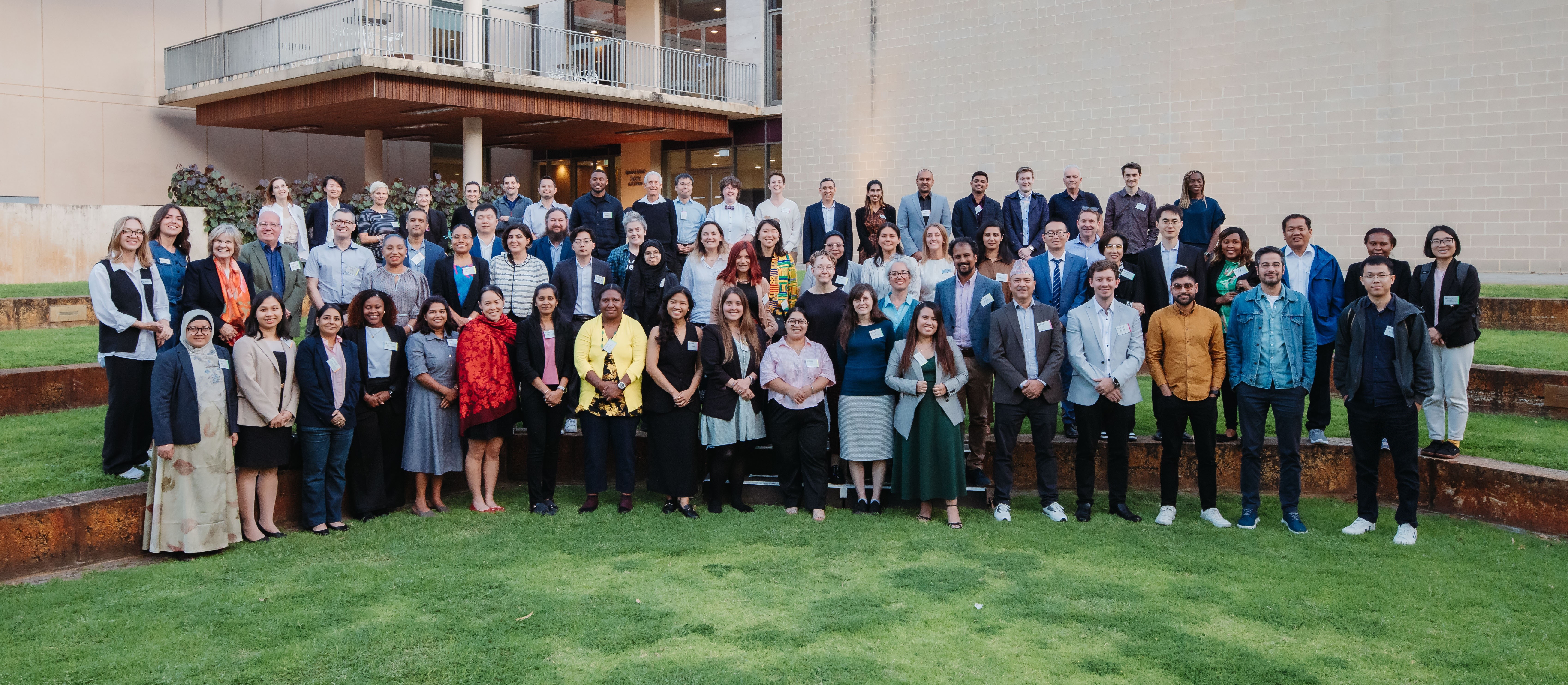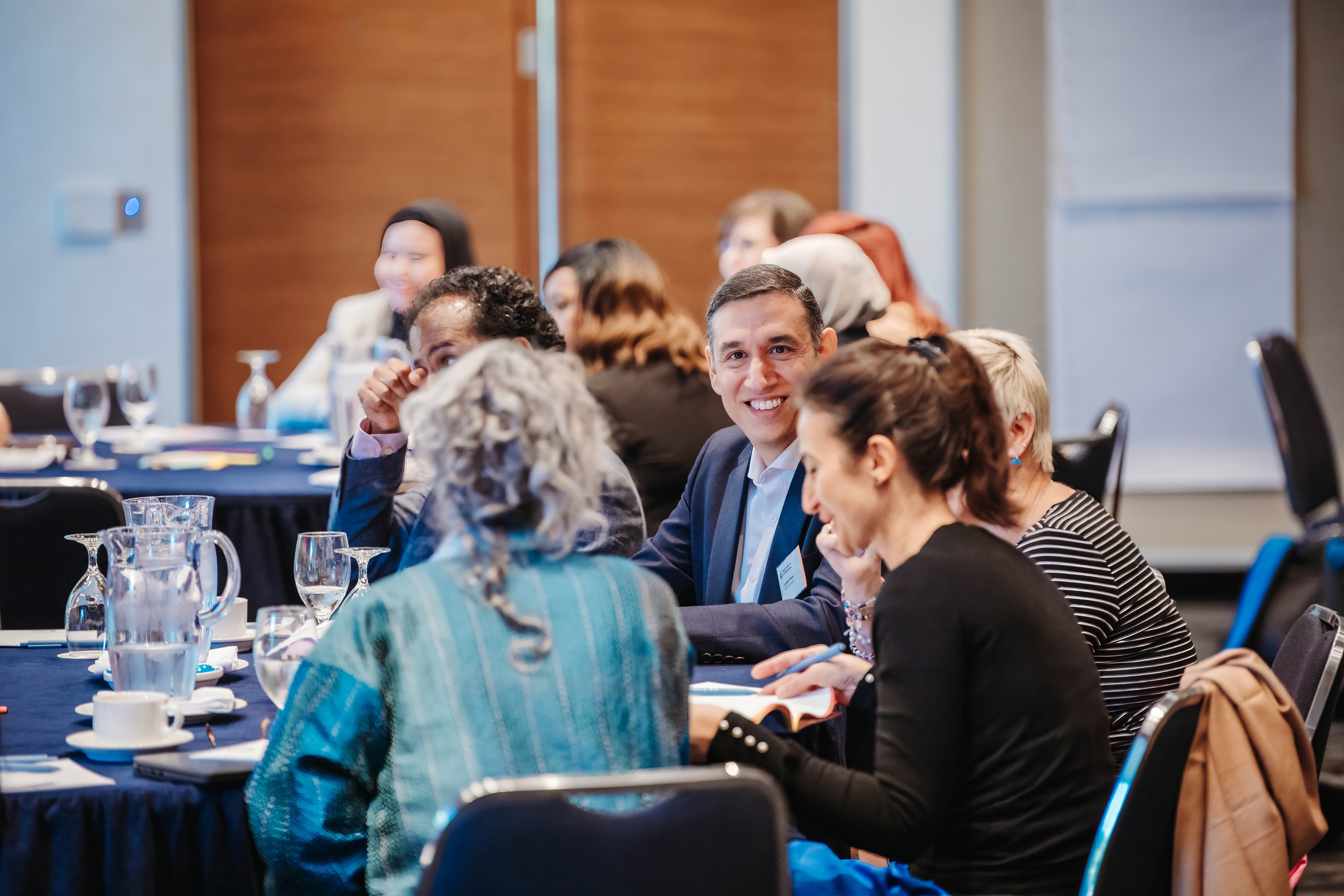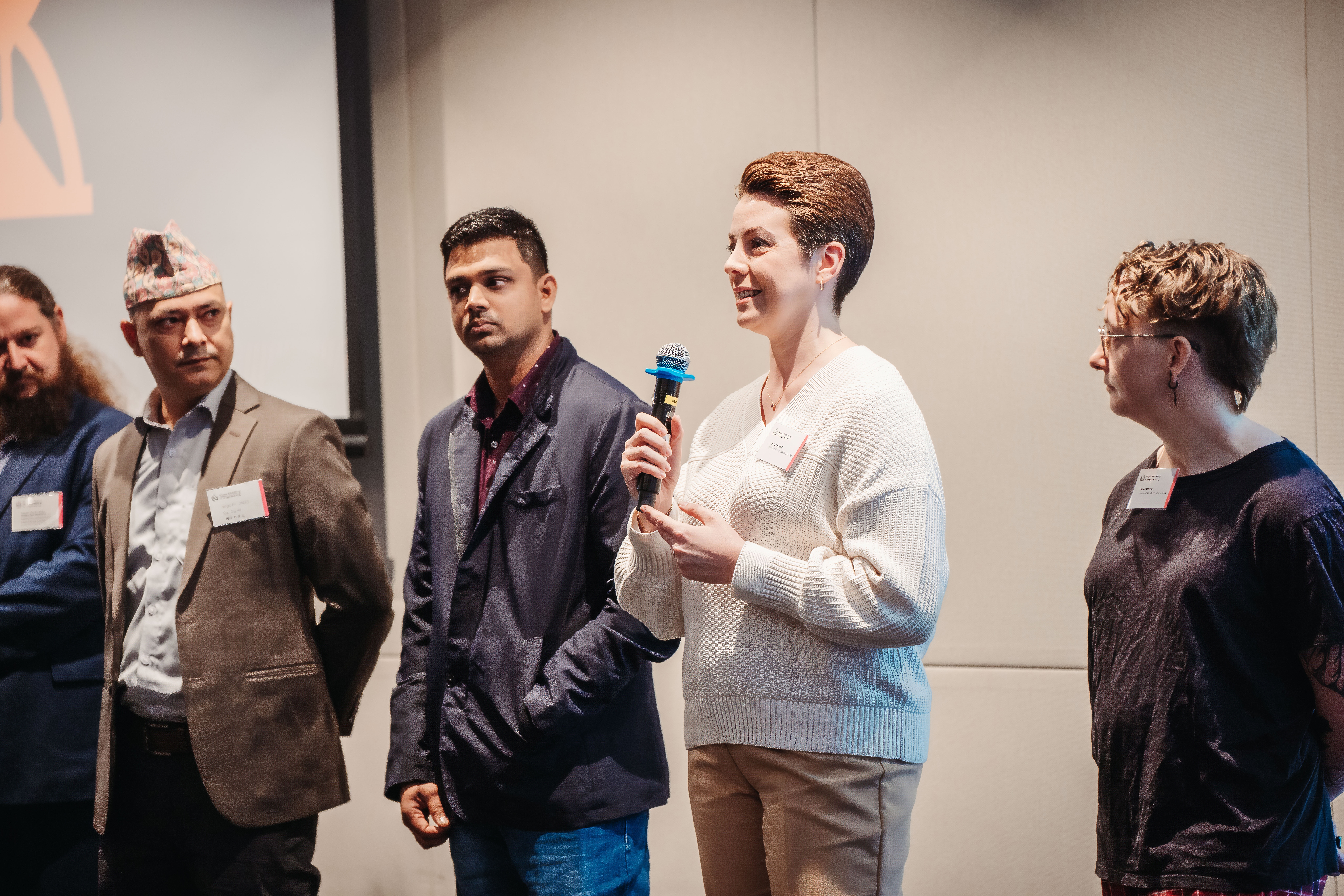
Group photo of delegates at a Frontiers event in Australia
In early October 2024, we had the privilege of co-chairing the Frontiers symposium on Empowering resilience: integrating innovation, sustainable communities, and climate adaptation strategies at the University Club of Western Australia in Perth. More than 60 thought leaders, researchers, and practitioners from 19 countries gathered to explore how we can empower people and communities to build resilience and adapt to the impacts of climate change. The symposium explored transformative approaches to climate adaptation, with a focus on sustainability, inclusivity, and innovation.
We found the discussions thought provoking, in particular the overarching challenge to break out of our comfort zones and contribute our disciplinary knowledge and skills to more collective ways of working. We get so used to thinking of ourselves as individual experts, rather than embracing the diversity of humanity and “working with” others to co-create contextualised solutions that address local needs and priorities.
Here are four key themes that emerged that we feel, should shape future action and ways of working in this field.
1. We need transformation, not incremental change
So many presenters talked about transformative adaptation, but what does it mean? Essentially, that incremental change –– is no longer sufficient to address the scale of climate challenges we face. We heard impactful examples of transformative strategies, for example “green corridors” in Medellín, Colombia. By thinking beyond “business as usual” urban design, Medellín has reduced city temperatures by up to 2°C in some spots. But there are also co-benefits including improvements in air quality and biodiversity. This work highlights how transformative urban adaptation can go beyond conventional methods to improve both climate resilience and quality of life.
Clever use of big data also offers a transformative approach that we would never have experienced even 10 years ago. Some authorities are beginning to use diverse sensor and demographic data to identify “cooling centres” in cities during extreme heat. These locations are flagged especially to vulnerable populations, where they can go to escape dangerous temperatures. Transformation means thinking differently, doing differently. It’s never easy to go against the flow, but never has the world needed more disruptors to change the status quo.
2. Integrate social and Indigenous knowledge
One of the most meaningful threads through our symposium was the emphasis on social and Indigenous knowledge systems. These perspectives, that “western science” tends to overlook, provide insights for sustained ecological resilience. Local and Indigenous understandings help to create culturally attuned and grassroots solutions. Session chair Dr Leanda Mason, a proud Noongar researcher, spoke about Indigenous ways of understanding nature as interconnected and equally significant – quite a contrast from scientific approaches that tend to see and solve problems in isolation. This holistic approach, grounded in 60,000 years of Australian Indigenous continuous culture, offers a valuable model for addressing climate challenges inclusively.

Delegates at Frontiers taking part in a group discussion
We also discussed examples from rural African communities, where local knowledge has shaped effective climate adaptation initiatives. These community-led efforts empower people to tackle local climate impacts directly, building resilience through knowledge-sharing. As co-chairs we hope these carefully selected participants do not return to their institutions and just sit on their hands, happy with “business as usual”. We want them to take a lead by implementing their learning and honing their collaborative skills. We encouraged them all to act, to embrace a diversity of perspectives in their work, and bring their cultural and professional knowledge to the fore.
3. Systems thinking in the face of chaos
Systems-based resilience and disaster recovery was a central theme of a session about integrated approaches to disaster risk reduction. We saw powerful examples illustrating how interconnected vulnerabilities can exacerbate disaster impacts, demanding comprehensive, rather than isolated, responses. Session co-chair Dr Yasemin Didem Aktas spoke about the February 2023 earthquakes in Turkey and Syria, which highlighted how the combination of damaged roads and hospitals, and disrupted communications, cascaded to worsen the disaster’s effects.
Session co-chair Dr Didem Aktas also championed forecasting and scenario planning as proactive tools to identify and address hidden vulnerabilities within complex systems. But she had a caveat: communities had to be involved. By identifying weak points in advance, communities can be better prepared and more adaptable when disasters strike. We need holistic change to tackle so many interconnected challenges.
4. Policy and governance is important
For most people, working on the frontline to protect and save lives is both a challenge and a privilege, but we cannot overstate the importance of policy and governance in effective climate adaptation. Policies shape the environments in which we work and the priorities to which we attend. We both enjoyed keynote Professor Peter Newman’s excellent insights on how policy is supporting the growth of renewable energy in the Association of Southeast Asian Nations (ASEAN) nations, the use of community batteries in Western Australia, and “trackless trams” for public transport. These examples are testament to how governance can drive climate resilience, making cities both sustainable and liveable. We reminded participants that both ancient and contemporary knowledge should shape future policy frameworks.

Group of Frontiers delegates sharing their discussion with the audience
Collaboration and the power of shared knowledge
Collaborate, collaborate, collaborate. There was no escaping this key message across the three days. Participants connected, shared their expertise and bounced ideas off each other. This openness to sharing and learning was delightful and created such a vibrant atmosphere – and is exactly the level of interdisciplinary engagement we need for effective climate adaptation. Bridging divides is hard but absolutely necessary said Simon in his closing remarks. The challenge for all of us, as a community, is to redesign and rethink systems, then act.
As participants reflected on the knowledge they gained and the connections they made, the importance of shared understanding, consensus and community was clear. Participants left inspired to nurture new relationships and use the power of collective strength. We hope the resilience of these networks will underpin the climate resilience of systems and communities worldwide.
Our heartfelt thanks to all who contributed to this Frontiers Symposium, and special thanks to both the Royal Academy of Engineering and the Australian Academy of Technological Sciences and Engineering (ATSE). For a full summary of this Frontiers symposium, please view the event report and explore the seed funding projects that emerged from the event.
